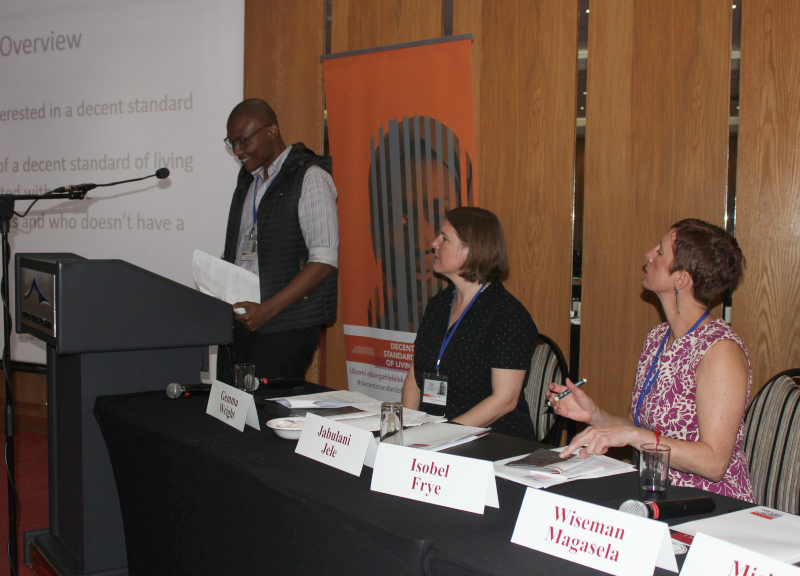
The 4th annual Decent Standard of Living (DSL) Colloquium was held in Pretoria on the 31st of October 2019.
Addressing an attentive audience Dr Philip Alston, UN Special Rapporteur on Extreme Poverty, said that the adoption of the Decent Standard of Living (DSL) approach is extremely important in South Africa, considering the current problematic socio-economic situation.
WATCH: Full speech by Dr Phillip Alston, UN Special Rapporteur on Extreme Poverty
Alston also stated: “We are not just trying to satisfy the bare minimum but to promote the notion of DSL that is much more adequate and decent to enable people to enjoy the fullness of their lives.”
The colloquium was centred on the theme of ‘disrupting poverty’ and moving towards providing a decent life for all, linking the concept of DSL to that of human dignity and well-being.
Isobel Frye, Director of Studies in Poverty and Inequality Institute (SPII), said in a country as divided as South Africa, the rationale behind adopting the DSL approach was to know if “it is possible to conceptualize a standard of life for everybody that goes beyond the absolute minimum deprivations, starvation, and survival”. Hence, the careful and immersive research conducted with ordinary citizens as experts of their realities to properly understand what constitutes a dignified and decent standard of life for them.
The adoption of the DSL approach does not necessarily solve all of our problems, but it can be used as a blueprint towards alleviating poverty and inequality in South Africa in a way that recognises what is required to create lives with dignity. The DSL can, therefore, be seen as an important first step by clearly modelling and measuring what people need to thrive and to be active citizens.
The DSL approach is also a response to a call by the United Nations for countries to develop unique and context-specific standards of an ‘Adequate Standard of Living’, which the UN highlighted as essential for combating poverty and inequality. The DSL, therefore, acts as an advocacy tool to progressively realise socio-economic rights.
South Africa is the most unequal country in the world and the majority of citizens live in poverty. In his address, public policy expert Dr Wiseman Magasela asserted that the “DSL approach resonates with the South African Constitution,” fundamental to which is the right to dignity for all South Africans. He further stated that the DSL is important because it seeks to address “all aspects of the injustices that South Africans have undergone and that still exist at present.”
South Africa has also made commitments to achieving the Sustainable Development Goals, which include ending poverty and hunger, by 2030. Much more needs to be done to make a difference in people’s lives. The DSL seeks to address the challenge.
Dr Kefiloe Masiteng from the National Planning Commission (NPC) indicated that there is a need to “prioritise a social protection floor that should be available to all and provide an acceptable/decent standard of living”. Prioritising a social protection floor will not only ensure poverty reduction and promote socio-economic rights, but also enhance the standard of living for all.
Mr Hassan Mohamed of Department of Planning, Monitoring and Evaluation (DPME) stated that “the operational potential of the DSL can serve as a yardstick of how we are progressing as a country”. It does so by providing a framework for the government and ordinary citizens to keep track of patterns and progress, with the aim of creating a just and equitable society.
While theorists can debate about poverty from their chairs, what really matters is the lived experiences of poverty by ordinary South Africans. Ordinary citizens have complex and embodied knowledge of their lived realities and the DSL, which is developed with them, is a conceptually innovative measurement grappling for change.
Moving forward, the DSL needs implementation by those who are in power. As the work of Professor Gemma Wright and Mr Jabulani Jele has shown, an incredibly meagre “3% of South Africans have a Decent Standard of Living.” In this context, it is essential for change to take place. That kind of change needs new tools to become a reality. And one such tool is the DSL.
Precious Manyisa is a Researcher and Budget Analyst at SPII
***This is an unedited version of the article submitted to The Citizen
*** Main Picture L-R: DSL SA project team members – Jabulani Jele (SASPRI), Dr Gemma Wright (SASPRI), Isobel Frye (SPII)
The decent standard of living project is a collaboration of SPII, Southern African Social Policy Research Institute and Labour Research Service.
View photographs of the 4th Colloquium
View Facebook Livestream here and here

Recent Comments